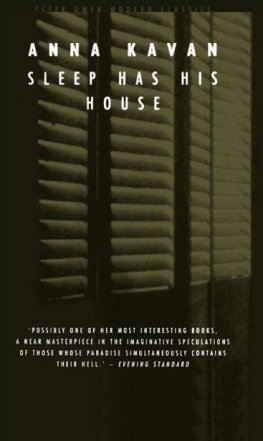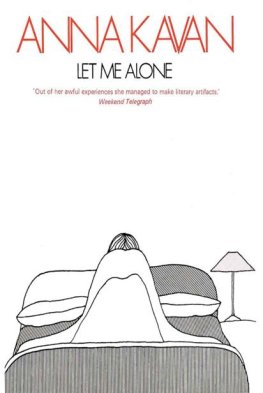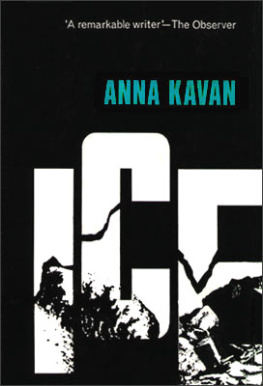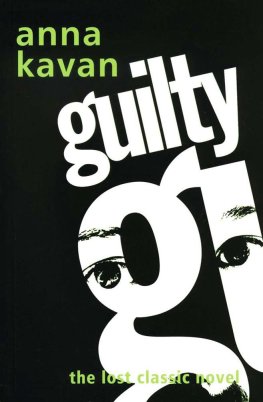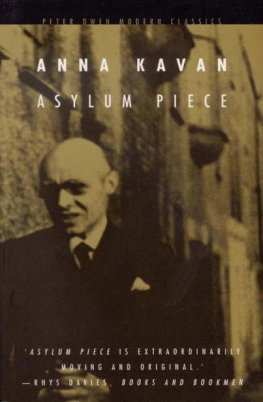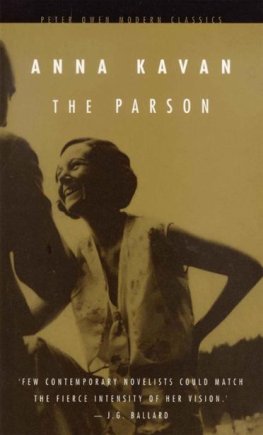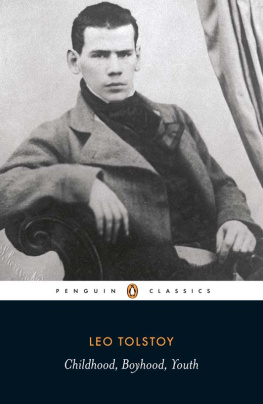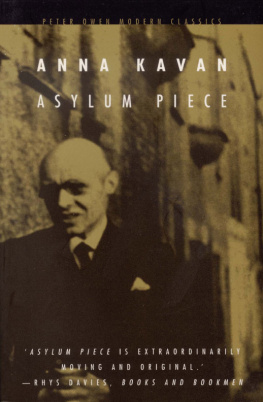Anna Kavan
Sleep Has His House
PRAISE FOR SLEEP HAS HIS HOUSE
A near-masterpiece in the imaginative speculations of those whose paradise simultaneously contains their hell. The Times
Anna Kavans night-time language is in no way obscure: on the contrary, her dreams are as carefully notated as paintings by Dal or de Chirico. New Statesman
Her dramas are haunted by a tall woman in black her mother. There is also a revealing passage of an addicts sordid bedroom, littered with needles and spilled powders Her writing is magnificent. It is a fascinating clinical casebook of her individual obsessions and the effects of drugs on her imagination in the tradition of the great writers on drug literature, de Quincey, Wilkie Collins, Coleridge.
Daily Telegraph
A testament of remarkable, if feverish beauty. Robert Nye, Guardian
A daring synthesis of memoir and surrealist experimentation, Sleep Has His House charts chronologically the stages of the subjects gradual withdrawal from all interest in and contact with the daylight world of received reality. Brief flashes of daily experience from childhood, adolescence and youth are described in what Kavan terms night-time language a heightened, decorative prose that frees these events from their gloomy associations. The novel suggests we have all spoken this dialect in childhood and in our dreams, but these thoughts can only be sharpened, or decoded by contemplation in the dark.
Anna Kavan maintained that the plot of a book is only the point of departure, beyond which she tries to reveal that side of life which is never seen by the waking eye, but which dreams and drugs can suddenly illuminate. She spent the last ten years of her life literally and metaphorically shutting out the light; the startling discovery of Sleep has His House is how much these night-time illuminations reveal her joy for the living world.
ANNA KAVAN, nee Helen Woods, was born in Cannes probably in 1901; she was evasive about the facts of her life and spent her childhood in Europe, the USA and Great Britain. Twice married and divorced, she began writing while living with her first husband in Burma and was published under her married name of Helen Ferguson. In the wake of the collapse of her second marriage, she suffered the first of many nervous breakdowns and was confined to a clinic in Switzerland; she emerged from her incarceration with a new name Anna Kavan, the protagonist of her 1930 novel Let Me Alone an outwardly different persona and a new literary style. Her first novel in this guise was Asylum Piece, and it achieved for her a certain recognition.
She was a long-term heroin addict and suffered periodic bouts of mental illness, and these facets of her life feature prominently in her novels and short stories. She died in 1968 of heart failure soon after the publication of her most celebrated work, the novel Ice.
in a strange land, on the
borders of Chymerie the god of
sleep has made his house which of
the sun may naught have, so that no man
may know aright the point between the day
and night Round about there is growing on the
ground, poppy which is the seed of sleep a
still water runs upon the small stones
which gives great appetite for
sleep. And thus full of delight
the god of sleep has his
house.
JOHN GOWER
LIFE IS TENSION or the result of tension: without tension the creative impulse cannot exist. If human life be taken as the result of tension between the two polarities night and day, night, the negative pole, must share equal importance with the positive day. At night, under the influence of cosmic radiations quite different from those of the day, human affairs are apt to come to a crisis. At night most human beings die and are bom.
Sleep has his house describes in the night-time language certain stages in the development of one individual human being. No interpretation is needed of this language we have all spoken in childhood and in our dreams; but for the sake of unity a few words before every section indicate the corresponding events of the day.
IT is not easy to describe my mother. Remote and starry, her sad strangers grace did not concern the landscape of the day. Should I say that she was beautiful or that she did not love me? Have shadows beauty? Does the night love her child?
WHAT A FEARFUL thing it can be to wake suddenly in the deepest hours of the night. Blackness all round; everything formless; the dark pressing against the eyeballs; the darkness a black thumb pressed to the starting eyeballs distended with dread. At first I dont know what I am to become. I am like an embryo prematurely expelled from the womb. I remember nothing, know nothing: I havent the least idea what is making me tremble all over like a person suffering the effect of shock. It happens to be the cruellest shock of all I am suffering from: the brutal violence of the birth shock.
I must find myself, I cannot drown in so black a sea, and I begin to strike out, threshing about desperately, this way and that, in pursuit of the images which appear, transparent as the shadows of icicles, incorporated in the night-plasma. Floundering among the waves, my head just above water, the most shapeless water, I plunge into a picture: but at once the outlines disintegrate, coldly coldly no frost flower decorating a window-pane vanishes more inexorably in the sun. Into the ephemeral images I dive, one after the other: sometimes one crystallizes into a brief sharpness never to permanence. At last I dive with extraordinary accuracy into my own body, which I see laid out, high and dry, above the receding tide. I am lying there like a long white fish on a slab. Is it a bed or a bier that Im lying on? Or have I really been washed up on some beach or other?
I feel the sides of the thing Im lying on with my hands. Yes, its a bed, no doubt of that. Im myself, alive on a bed, not drowned or exposed in a morgue. Nor am I a fish on a fishermongers marble slab.
So far so good. But what bed it is that Im lying on Im not able to say. What room is this? I look round for a window. Is it there? Or there? Or perhaps over there, where, in any case, I feel a door ought to be? Theres not a single gleam, not a glimmer, to give me a clue. The whole room is as black as pitch. In fact, Im not at all sure that it is a room. Something suggests to me now that Im on board ship; I might be floating adrift on some tranquil sea. And yet theres no sound, no motion, nothing to indicate either sea or land. Like a ghost train my life streams through my head, and I dont know which point of the compass Im facing.
How dark it is. The moon must have stolen away secretly. The stars have thrown their spears down and departed. There seems to be nothing except primordial chaos outside the window. Utterly still, utterly alone, I watch the darkness flower into transient symbols. And now there is danger somewhere, a slow, padded beat, like cushioned paws softly approaching. What an ominous sound that is to hear in the night.
THE first place I remember was warm and sunny. I remember the fiowers that grew there, and trees smelling of summer. The sun always seemed to shine in that country. I dont remember seeing my parents often. A Japanese houseboy looked after me most of the time. He was kind and told me many beautiful stories. He drew pictures to please me, plants and zmagical fishes.
UP, UP, up swings the little boat, gently, languidly climbing the enormous swell, like drifting thistledown, scarcely seeming to move. The tiny boat hardly seems to be moving at all, but up it climbs on the huge blue undulation, up, up, towards the solemn clouds standing in tall arcades, far too bright for the eyes. In a dazzle of utter blue, the boat climbs to the waves shoulder. And down, down, down, it begins to travel, with emerald facets glittering on the blue. The descending swell bums translucent, a fiery barrow, entombing the amethyst shades of sea-lions, over which the little boat glides with blithe unconcern.

